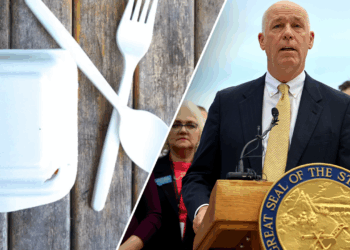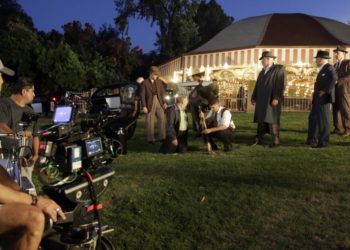President Donald Trump‘s announcement of a plan to try to help the American movie industry by imposing tariffs on films made abroad has drawn much confusion and criticism. But Hollywood is in freefall. California productions have flatlined and landing a TV writing job is now like competing in The Hunger Games. Can the business, as we know it, be saved—and who is truly to blame for its current implosion?
Here’s a wacky theory regarding the second question from this journalist turned TV writer: Trump viewers have brought Hollywood to its knees, with an assist from the series The Wire and other “prestige” TV projects.
Here’s what I mean.
When I was a kid, there wasn’t a thing called “prestige” television. There was just television. If it was good, everybody watched it. If it was bad, it got canceled and mostly forgotten.
St. Elsewhere, Cagney & Lacey, The Golden Girls, The Jeffersons—all of these classic shows were mainstream hits, driving cultural conversations, generating massive audiences and winning plenty of critical acclaim. And they were all on network television.
But cable created a class divide. I once had to beg a friend to let me come over and watch Sex and the City—she could afford cable and I couldn’t. This divide was exacerbated by entertainment journalists and insiders who become increasingly enamored with shows many Americans weren’t actually watching. (I became acutely aware of this when Lena Dunham’s Girls became a phenomenon. There was endless coverage of Girls in the press, even though just a few hundred thousand people were watching it.)
Sex and the City and The Sopranos were among the first wave of shows that became like a secret only cool kids could discuss. The Wire was a tipping point. It was gritty, based on real-life and created by the journalist turned TV legend David Simon—not necessarily fun viewing, but the sort of show you’re supposed to watch. But despite the insistence of my fellow writer friends who are obsessed with it, The Wire was not a big hit. It did not win major awards, nor did it score great ratings. The audience it did find, however, was prestigious, including President Barack Obama.
I’ll never forget the time another writer reprimanded me for not watching every episode of The Wire, though I had watched every episode of a show she worked on. But it was a network show and she therefore found my taste questionable, which is still hilarious.
What’s not funny, however, is how much the divide between The Wire obsessives and everyone else has grown since I entered the industry. When I started, meetings ran the gambit from family dramas, comedies and superhero shows. Eventually though, every project centered on something “edgy.”
But ratings data consistently asserts the dominance of CBS, home to numerous middle-of-the-road sitcoms and procedurals. Most Americans don’t want “edgy.” Today, real-life is edgy enough.
The divide that has emerged in entertainment consumption parallels our country’s political divide. The campaign against Donald Trump was predicated on the idea that smart people would never vote for him; Hollywood keeps making stuff that few people want to watch, then claiming it’s “prestige” television that only smart people get. Is it a surprise then, that most of Hollywood endorsed Kamala Harris and half of the country shrugged and voted for the other guy?
Conservative writer Jon Podhoretz predicted in 2021 that media elites’ obsession with the show Succession—versus Yellowstone, despite the latter having a much larger audience—portended a potential Trump re-election. He was right. The question is whether or not Hollywood has learned anything since.
Ironically, those network shows on when I was a kid could be considered “edgy.” The Golden Girls was one of the first television shows in which a gay couple discussed their wedding. It also featured an interracial couple, but was not the first—that would be The Jeffersons. Cagney & Lacey tackled the abortion debate way back in 1985.
These shows respected viewers enough not to talk down to them. They trusted that if the writing was good, and the actors were great, Americans—of all political affiliations and races—would watch. Research confirms that TV shows can move the needle on people’s political and social attitudes—but only if people watch them! By ideologically segregating content, Hollywood has actually been moving our country backwards. Unfortunately, many of its decision-makers are too lacking in ideological diversity themselves to see it.
I’m hoping this changes soon. Maybe the prospect of production and shoots spreading out nationwide will help. Because I shudder to think what our country’s political landscape will look like if people never watch TV shows with their family members and friends again. Republican operative Karl Rove credits The Cosby Show with changing perspectives on Black Americans in a way that paved the way for the election of President Barack Obama. But that only happens if Americans who disagree on politics can agree on what constitutes great TV.
The post Opinion: How Trump Voters and ‘Prestige’ Programming Brought Down Hollywood appeared first on The Daily Beast.




